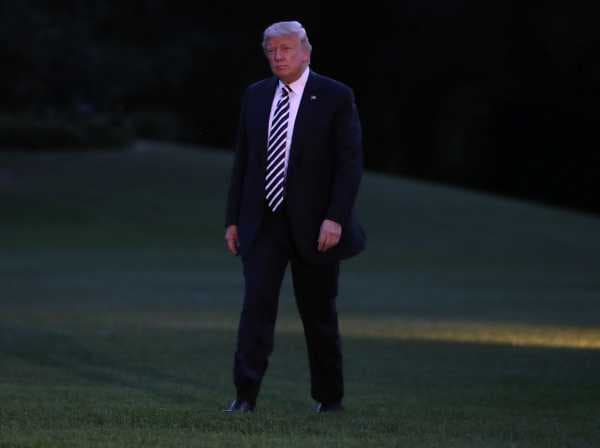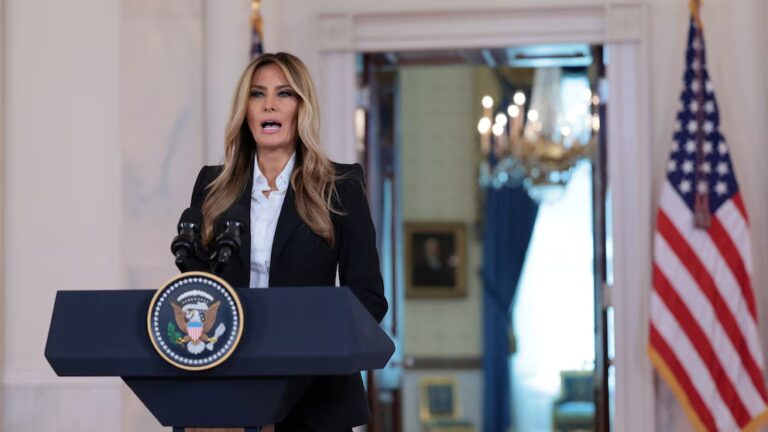
Just ahead of Labor Day weekend, President Donald Trump announced he would freeze the salaries of some 2 million federal workers next year. After outcry, Trump said he’d use the long weekend to “study” the matter. Thus far, he’s spent much of the long weekend on the golf course and rage tweeting about Canada, the Department of Justice, the Russia investigation, his approval ratings, and Tiger Woods.
On Thursday, Trump sent a letter to Congressional leaders saying that the US federal government’s budget can’t support a scheduled 2.1 percent across-the-board pay raise for civilian federal workers slated to kick in in January 2019, or the accompanying raises dependent on where an employee works. He said the increases are “inappropriate,” citing his presidential power over federal employee pay in the case of “national emergency or serious economic conditions affecting general welfare.”
The maneuver sparked near-immediate criticism from unions, Democrats, and even some Republicans. Trump’s decision comes less than a year after he signed a $1.5 trillion tax cut bill and also just days before the US holiday meant specifically to honor workers.
Trump in remarks in Charlotte, North Carolina on Friday seemed aware of the backlash. He said he was “going to be doing a little work over the weekend” and “studying” federal worker pay.
“People don’t want to give them an increase. They haven’t had one in a long time,” he said. “I said, ‘I’m going to study that over the weekend. It’s a good time to study it — Labor Day.’”
It’s not clear what sort of studying Trump’s been doing. He spent time both Saturday and Sunday at his golf club in Sterling, Virginia and fired off a series of angry tweets. Many of them mentioned Fox News personalities, such as Gregg Jarrett and Jesse Watters,
Trump wasn’t worried about fiscal responsibility with the tax cuts. But when it comes to workers, he’s suddenly concerned.
Federal workers’ wages are scheduled to increase annually under a 1990 law, but the president is able to limit those increases. And Trump isn’t the first one to do so. As the Wall Street Journal notes, President Barack Obama curbed pay increases to 2 percent in 2010 in the wake of the financial crisis and froze worker pay in 2011 in response to rising budget deficits. Congress also chose not to authorize raises in 2012 and 2013. Workers got a 1 percent pay boost each year from 2014 through 2017, and this year, they got a 1.4 percent bump.
But Trump’s decision to freeze pay, especially when you look at his explanation that it’s tied to “national emergency or serious economic conditions” compared to his usual rhetoric celebrating the strength of the US economy, doesn’t seem to add up.
New government data this week showed the economy grew by 4.2 percent in the second quarter — something Trump’s bragged about a lot. Republicans just passed a huge tax cut, insisting that it would translate to an economic boom. The administration said the tax bill would deliver an average $4,000 pay boost to American household annually. It hasn’t yet materialized for workers, and if there’s a pay freeze in place, for federal workers it most certainly won’t.
Eric Yoder at the Washington Post points out that Trump’s decision throws the White House’s weight behind one side of a possible budget deadlock in Congress: The House has passed spending legislation that doesn’t mention a raise; the Senate’s bill allows for a 1.9 percent pay increase, with 1.4 going to across-the-board raises. With Trump’s decision, the only way for federal employees to get a raise next year would be for Congress to pass a bill mandating it and the president to sign it. Next week, the two chambers will begin negotiations to iron out differences between their spending bills.
It’s not clear how much exactly the government is saving in axing across-the-board raises next year, but Trump said locality increases would add up to $25 billion. The tax cuts are expected to cost $1.5 trillion over 10 years. The annual federal budget deficit is expected to pass $1 trillion next year.
The 2.1 percent across-the-board pay raise federal workers were expected to get was about in line with Federal Reserve expectations for inflation, meaning it would have been more of a cost-of-living adjustment than anything. Trump isn’t ruling out all pay raises — performance-based hikes are still allowed.
Trump’s “studying” doesn’t look very studious
The White House has been criticized for its pay freeze decision from both sides of the aisle.
Republican Rep. Barbara Comstock said she opposes the maneuver in a statement, saying public servants “have been getting shortchanged for years.” Democratic Sen. Mark Warner called the decision “the latest attack in the Trump administration’s war on federal employees.” Both lawmakers represent Virginia, where there is a large federal workforce.
International Association of Machinists and Aerospace Workers president Robert Martinez Jr. tied the pay freeze decision directly to the tax cuts. “It seems we can afford lavish tax cuts for the rich, but not decent wages for the men and women who keep our warfighters prepared for battle, print the money we spend, and put out fires in the West,” he said, according to WSJ.
Tony Reardon, president of the National Treasury Employees Union, said Trump’s decision was “deeply disappointing” and signals that the administration “in this economic environment, simply does not respect its own workforce.”
Trump, a billionaire businessman who spent his entire career in the private sector, hasn’t been a particular friend to government workers and unions as president.
His announcement on the pay freeze comes just days after a federal judge invalidated key provisions in three executive orders he issued in May that made it easier for agencies to fire federal workers and placed restrictions on union activities. The New York Times reports the administration seemed to be dragging its feet in complying with the judge’s ruling, and some agencies told managers and union officials that the policies implemented in May are still in effect.
He seems to want people to think he’s still on the fence about the pay freeze, hence the “studying” comments, but he’s already issued the order.
Trump on Saturday retweeted a message from Republican Senate candidate in Virginia Corey Stewart, saying federal workers “endured 8 years of hell under Obama” and expressing hope that Trump can “fix this.”
If Trump does reverse course, it will be to address an immediate problem of his own making. He said he would take a second look at it over the weekend, and the retweet indicates it could be at least peripherally on his mind. But it’s likely not the center of his attention: on Sunday, he spent his second consecutive day at his golf course.
Sourse: vox.com






